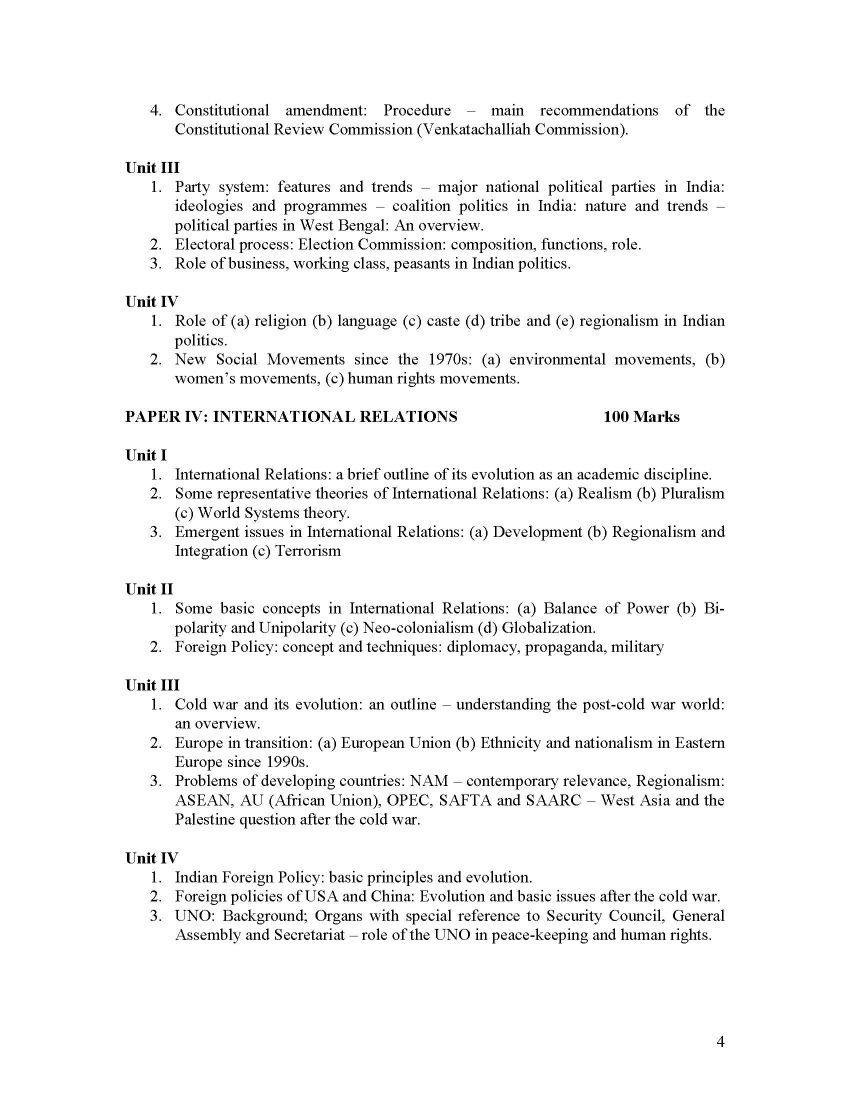|
#5
19th September 2019, 11:38 AM
| |||
| |||
| Re: Calcutta University Political Science Syllabus
As you want here I am giving bellow Calcutta University B.A. (Honours) Course in Political Science program syllabus so will you plz provide me same here : B.A. (Honours) Course in POLITICAL SCIENCE Part I F.M. 200 Paper I: POLITICAL THEORY: 100-Marks Unit I 1. What is Politics Approaches to the study of Politics: Normative, Behavioural and Post-behavioural. Feminist views to Politics. 2. Theories of the State (a) Origin: Social Contract Theory; (b) Nature: Idealist, Liberal and Neo-liberal theories. 3. Concept of State Sovereignty: Monistic and Pluralistic theories Changing concepts of Sovereignty in the context of Globalization. Unit II 1. Democratic Theories: David Helds Classification: Protective (Bentham), Developmental (J.S. Mill), Participatory. 2. Liberty, Equality, Rights and Law: concepts and their interrelations Justice: concept theory of Rawls. 3. Empirical political theories: Systems Analysis, Structural-Functionalism. Unit III 1. Marxist approach to the study of Politics. 2. Dialectical Materialism and Historical Materialism with special reference to relationship between base and superstructure Concepts of Class and Class Struggle. 3. Marxist theory of the State the question of relative autonomy. Unit IV 1. Marxist Concepts of Freedom and Democracy. 2. Marxian theory of Revolution: contributions of Lenin and Mao. 3. Marxian theory of the Party: Lenins contribution Lenin Rosa Luxemburg Debate on Party. PAPER II: COMPARATIVE POLITICS & GOVERNMENT 100 Marks Unit I 1. Distinction between Comparative Politics and Comparative Government Development of Comparative Politics. 2. Scope, purposes and methods of comparison Approaches to the study of Comparative Politics. 3. Federal systems: federalism in USA and Russia Unit II 1. Nature of liberal and socialist political systems their distinguishing features, with special reference to conventions, rule of law, parliamentary sovereignty (UK), separation of powers, checks and balances, judicial review (USA), ideology, democratic centralism (PRC), referendum, initiative (Switzerland). 2. Political Parties: features and role of party system/parties in UK, USA and PRC. Interest groups: their roles and performance in UK and USA Unit III 1. Legislature in UK and PRC: composition and functions of the legislative chambers the NPC in PRC role of second chambers in UK and USA Committee system in UK and USA role of speakers in parliamentary and presidential systems (UK and USA). 2. Executive in UK, USA, France and Russia: A comparative study of (i) Russian, French and American Presidency; (ii) British and French cabinet systems. Unit IV 1. Relation between executive and legislature in UK, USA and PRC: A comparative study. 2. Judiciary in UK, USA and PRC (with special reference to the procuratorate): A comparative study. 3. Rights of the citizens of UK, USA and PRC: A comparative study Duties of the citizens of PRC. Calcutta University B.A. (Honours) Course in Political Science program syllabus     |